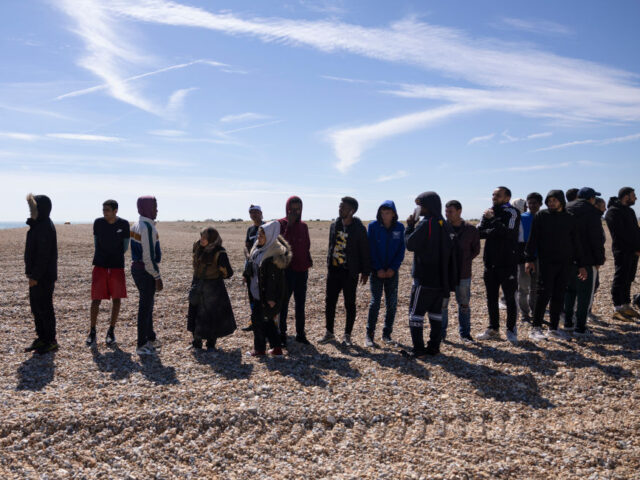A new report warns that whatever the outcome of present legal wrangling over the Rwanda asylum plan and the government’s new border bills the likely outcomes are a deteriorating border situation and a considerably higher annual bill for housing the tens of thousands of migrant arrivals ‘irregularly’ every year could soar into the billions.
Tony Blair-linked progressive think tank the Institute for Public Policy Research (IPPR) has published its new report on the growing English Channel migrant crisis, appearing to criticise the Conservative government’s flailing attempts to deal with the issue and warning costs will spiral as migrants become trapped in the United Kingdom by the system.
Key to the criticism is the coming rules being introduced by the government that alleged asylum seekers trying to subvert the UK’s immigration rules would have their claims ruled permanently inadmissible, alongside the Conservative’s long-term failure to actually deport anyone. These two factors running in tandem, the paper warns, would create what they have christened a “perma-backlog” of people who have no right to live and work in the United Kingdom, but who also won’t voluntarily leave and would live in a state of permanent limbo in government-provided accommodation.
‘Don’t Call it an Invasion!’ Illegal Migrant Crossings of English Channel Top 17,000 https://t.co/CU4H77KeOD
— Breitbart London (@BreitbartLondon) August 17, 2023
Even if the government was able to remove 500 migrants per month to counties like Rwanda — a level of deportations characterised as the ‘high removals’ scenario by the paper, underlining the extremely low expectations of success — housing migrants in “limbo” would reach £5 billion ($6.3bn) a year by the end of the decade, the IPPR said. They said that if the removals were even less successful and ran at a rate of 50 per month, the bill could be £6 billion ($7.6bn) a year.
In 2022, it was reported that the government was paying £1.7 billion ($2bn) a year for asylum accommodation costs.
Comparing these figures to the situation now, 500 removals a month — or 6,000 a year pales in comparison to the 18,000 arrivals who have come to the United Kingdom this year alone. Indeed, 661 people arrived on 15 small boats on Monday of this week alone, well above the IPPR’s monthly ‘high’ removals case.
The IPPR document does, however, come with its own biases. It does not, for instance, foresee any circumstance where migrant arrivals might decrease, either from being discouraged by the government’s plans to make the UK less attractive as a destination, or a circumstance where the government starts turning back the boats. Indeed, the report claims if undermining the UK’s immigration rules by boat becomes more difficult, then migrants will simply “try to arrive undetected and instead take more dangerous routes”, a clear implication that even trying would be an undesirable action.
English Channel: Four ‘People Smugglers’ Held Over Deadly Migrant Boat Disaster https://t.co/icDrrS1mRe
— Breitbart London (@BreitbartLondon) August 18, 2023
The document comes amid several clear signals from the government that even they, with their frequently publicised but ultimately fruitless initiatives aimed at the Channel migrant crisis, see absolutely no end in sight. Breitbart News reported earlier this month on allegedly leaked internal government documents making clear it was seeking new accommodation for migrant arrivals for the next five years and beyond, a clear indication that they foresee no timely conclusion.
Prime Minister Rishi Sunak himself buttressed that view today, explaining away his personal failure to fulfil his promise to get the situation under control this year, saying: “To be honest with people that it is a complex problem… I want it to be done as soon as possible, but I also want to be honest with people that it is a complex problem. There is not one simple solution and it can’t be solved overnight and I wouldn’t be being straight with people if I said that was possible.”
Articulating the views of many, the Prime Minister continued: “The current system is both unsustainable and is completely unfair, but particularly unfair on British taxpayers who are forking out millions of pounds to house illegal migrants in hotels and local communities.”
Immigration is perhaps one of the greatest electoral liabilities for the Conservative Party, given they fought and won elections for many years on a solid commitment to radically reduce arrivals of all sorts — ‘irregular’ as well as regular legal migration — from the hundreds of thousands to the tens of thousands. This never happened, and in fact, during the Conservatives’ time in power, migration has soared to all-time highs.
UK Saw Record 45,000 Clandestine Boat Migrants in 2022 as People Traffickers Ply Deadly Tradehttps://t.co/Z2PLYusNry
— Breitbart London (@BreitbartLondon) January 3, 2023

COMMENTS
Please let us know if you're having issues with commenting.